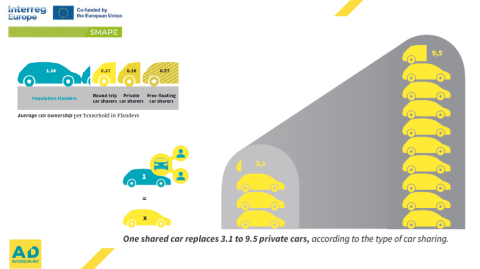It takes three to tango: recap from SMAPE webinar

The webinar titled "Dancing Together Towards Shared Mobility Governance", held on February 23, 2024, showcased the vital role local authorities play in fostering sustainable urban mobility. The SMAPE projects aim at reducing reliance on private cars and shifting towards zero-carbon urban mobility through shared transportation solutions. This approach is seen as crucial for enhancing the quality of urban life by mitigating traffic congestion, lowering emissions, and creating more livable cities.
Project partner Autodelen.net director, Jeffrey Matthijs, was the first one to set the tone of the conversation by proving the benefits of shared mobility from a sustainable and social perspective. Mostly, when this cases involved citizen cooperation and have an user-centric design. The panel discussion, facilitated by Pedro Homem de Gouveia, Senior Policy Advisor from POLIS, tackled the challenges of integrating shared mobility into existing transportation frameworks in different governance layers and overcoming resistance from skeptics. The speakers shared strategies for promoting shared mobility, such as demonstrating its tangible benefits, using data from successful implementations, and encouraging collaboration among stakeholders at different government levels.

Dutch National Shared Mobility Program
Ananda Groag, representing the Dutch national shared mobility program, focused on the necessity of adopting a holistic approach to shared mobility that is standardized, accessible, and benefits all societal segments. She discussed the program's success in fostering collaboration among diverse partners, including national and local governments, transportation authorities, and municipalities, to promote shared mobility. Goldberg emphasized the importance of creating a coherent offering of shared mobility services across different regions and the benefits of shared mobility, such as reduced congestion and emissions. Her presentation also touched on the program's history, starting with a public-private partnership in 2015, and its evolution into a nationally recognized initiative.
Wallonia Regional Mobility Strategy
Jonathan Fretin, from the regional administration in Wallonia, presented the regional perspective on shared mobility, detailing Wallonia's strategic approach to integrating shared mobility into the broader transportation system. He outlined Wallonia's mobility vision, which focuses on fluidity, accessibility, security, and modal shift, and how this vision translates into a concrete mobility strategy with specific undertakings related to shared mobility. Jonathan discussed the challenges of adapting shared mobility solutions to diverse urban and rural contexts within Wallonia and the importance of legal frameworks, monitoring, and incentives in promoting shared mobility. He highlighted the ongoing development of a shared mobility action plan aimed at translating strategic goals into actionable initiatives.
Shared Mobility Roadmap in Bergen
Lars Petter Klem and Bram Seeuws from the city of Bergen shared insights into the city's efforts to develop a shared mobility roadmap. Their presentation underscored the dynamic nature of urban mobility and the need for flexible, adaptable planning tools that can evolve with changing circumstances. They detailed Bergen's political framework for shared mobility, emphasizing goals such as reducing private car ownership and promoting the use of active and public transport. The duo discussed the process of creating the shared mobility roadmap, including defining shared mobility, benchmarking current services, and identifying the city's role in facilitating shared mobility. They outlined four priorities for Bergen's shared mobility efforts: making shared mobility accessible to all, tempting people away from private car use, contributing to a zero-emission society, and enabling seamless travel with integrated transportation options.
The "Dancing Together Towards Shared Mobility Governance" webinar successfully brought together experts and enthusiasts from across Europe to discuss the future of urban mobility. This event highlighted how important it is for local, regional, and national governments to work together to promote shared mobility. The insights and strategies shared during the webinar not only showcased the environmental and social benefits of reducing reliance on private cars but also offered practical advice on making shared mobility a regular part of city life. With the knowledge gained from this event, participants are now better equipped to support the shift towards more sustainable and efficient urban transportation.
